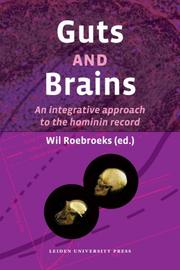| Listing 1 - 1 of 1 |
Sort by
|

ISBN: 9087280149 9786611787813 1281787817 9048508053 9789048508051 9781281787811 9789087280147 9789087280147 661178781X Year: 2007 Publisher: [Amsterdam] : Leiden University Press,
Abstract | Keywords | Export | Availability | Bookmark
 Loading...
Loading...Choose an application
- Reference Manager
- EndNote
- RefWorks (Direct export to RefWorks)
The human brain and its one hundred billion neurons compose the most complex organ in the body and harness more than 20 per cent of all the energy we produce. Why do we have such large and energy-demanding brains, and how have we been able to afford such an expensive organ for thousands of years? Guts and Brains discusses the key variables at stake in such a question, including the relationship between brain size and diet, diet and social organization, and large brains and the human sexual division of labour. This interdisciplinary volume provides an entry for the reader into understanding the development of both early primates and our own species. Waarom hebben wij zulke grote en energie-vretende hersenen? Hoe kunnen we ons zo'n duur orgaan permitteren, en hoe deden Neandertalers dat, hun brein was immers minstens zo groot als dat van de moderne mens? In deze bundel behandelen vooraanstaande onderzoekers de verwevenheid van belangrijke variabelen in deze, bijvoorbeeld de relatie tussen dieet en hersengrootte bij primaten, tussen dieet en sociale organisatie, en tussen grote, "dure" hersenen en de sexe-gebonden arbeidsverdeling bij hedendaagse jagers-verzamelaars. De bijdragen in Guts and Brains laten zien dat kleine veranderingen in het dieet van onze verre voorouders grote gevolgen hadden voor hun manier van leven en uiteindelijk ook voor die van de moderne mens. Daarmee geeft de bundel ons niet alleen een beter inzicht in de levenswijze van vroege mensachtigen maar ook in die van die eigenaardige primaat die wij Homo sapiens noemen, onze eigen soort.
Brain -- Evolution. --- Hominids. --- Human evolution. --- Hunting and gathering societies -- Nutrition. --- Prehistoric peoples -- Behavior. --- Prehistoric peoples -- Food. --- Primates -- Behavior. --- Primates -- Nutrition. --- Genetic Processes --- Nutritional Physiological Phenomena --- Catarrhini --- Investigative Techniques --- Biological Processes --- Central Nervous System --- Biological Phenomena --- Nervous System --- Analytical, Diagnostic and Therapeutic Techniques and Equipment --- Physiological Phenomena --- Haplorhini --- Genetic Phenomena --- Primates --- Phenomena and Processes --- Anatomy --- Mammals --- Vertebrates --- Chordata --- Animals --- Eukaryota --- Organisms --- Biological Evolution --- Brain --- Diet --- Hominidae --- Human beings --- Fossil hominids. --- Origin. --- History. --- Evolution. --- Early man --- Fossil hominins --- Fossil man --- Hominids, Fossil --- Hominins, Fossil --- Human fossils --- Antiquity of human beings --- Origin of human beings --- Health --- Food --- Food habits --- Nutrition --- Human remains (Archaeology) --- Primates, Fossil --- Paleoanthropology --- Human evolution --- archeologie --- archeology --- anthropologie --- homo sapiens --- neandertals --- brains --- anthropology --- Brain size --- Evolution --- Foraging --- Hominini --- Predation --- Primate
| Listing 1 - 1 of 1 |
Sort by
|

 Search
Search Feedback
Feedback About UniCat
About UniCat  Help
Help News
News